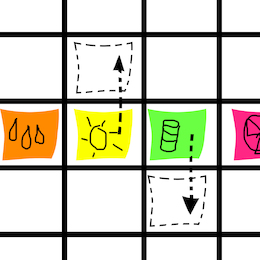Toolbox — For Training and Youth Work
All new tools in your inbox: Be the first to know about new tools for learning with our e-mail notifications.
Exercise, Info session
Group Debate on Energy
The competing groups try to prove their energy source is the best either by moving their energy source up the game board stating it's advantage, or moving an opponent team's source down the board stating it's disadvantage. Several rounds are played.
Aims of the tool
The aim of the debate is to learn the advantages and disadvantages of different energy sources, while developing reasoning, research and speaking skills of the participants.
Description of the tool
The participants are divided into 5 groups.
Each group is then assigned one energy source, e.g. oil, nuclear, solar, hydro, wind (depending on the goal of the exchange, the categories can be changed to either all renewable/all non-renewable sources).
[Optional: the teams can be asked to design their energy source post-it, e.g. to draw a graphic representation of their source on it]
The goal of the game is to move your team up the game board. (see attached file) The winning team is the one that climbs up the highest on the game board after several rounds.
Each round each team chooses either to move their team's post-it up the game board by stating an advantage of their energy source, or to move any other team's post-it down by stating a disadvantage of the opponent's energy source.
The participants are warned against choosing too general or too obvious advantages/disadvantages, such as "our source is renewable", but to rather concentrate on peculiar things that distinguish the energy source in question.
The first round starts with the first team stating an advantage/disadvantage, then is followed by a discussion, and then ends when the last team has spoken out and the sixth discussion has taken place. The second and the following rounds are identical to the first one. At the beginning of each round, allow for some time for teams to research / discuss their argument.
After the first team has stated the first advantage of their source/disadvantage of any other team's source, starts the discussion. The whole group decides whether the advantage/disadvantage stated is enough to change the game board. Here, several options are possible:
1) The team states an advantage of their energy source:
If the group decides it's a valid advantage, the team's post-it moves one level up on the game board;
If the group does not agree - nothing moves on the gameboard.
2) The team states a disadvantage of an opponent's energy source:
If the group decides it's a valid disadvantage, the opponent's post-it moves one level down the game board;
If the group decides it's not a valid disadvantage, the claiming team's post-it moves one level down.
[Optional: To facilitate the discussion, an external judge (member of the organizing team) might be introduced, who has the final say once the discussion time runs out.]
Then comes the second (third, etc.) team's turn; then the next rounds following the same pattern.
The game ends when the time is up/one team has climbed over the top of the board. The winner is then announced and awarded with a prize.
[Optional: the participants are told that the results of the debate do not necessarily reflect each energy source "coolness", but rather the persuasiveness of the winning team/the tactics chosen, and are invited to reflect on the topic, this time individually, to say what energy source would they have named the winner, now that they've learned so many facts.]
The optimal number of rounds depends on the length of the discussion after each team has spoken out and on the number of teams you choose.
P.S. I'd like to underline that the same framework can be applied to other topics as well.
Available downloads:
Disclaimer
SALTO cannot be held responsible for the inappropriate use of these training tools. Always adapt training tools to your aims, context, target group and to your own skills! These tools have been used in a variety of formats and situations. Please notify SALTO should you know about the origin of or copyright on this tool.
Tool overview

http://toolbox.salto-youth.net/1674
This tool is for
Any age group with limited to no knowledge of the topic.
and addresses
Group Dynamics, Peer education, Environment
It is recommended for use in:
Youth Exchanges
Materials needed:
- A flip chart or a large piece of paper for the gameboard;
- 5 post-its of different colors (each representing an energy type)
Duration:
Preparation time: <20 minutes (to prepare the gameboard).
Activity length: flexible, allow for the very minimum of 40 minutes.
Behind the tool
The tool was created by
Concept adapted from the U.S. National Energy Education Development Project
The tool has been experimented in
Energy Generation Youth Exchange, 1-9 of July 2015, Terrassa, Spain
The tool was published to the Toolbox by
Elena Talalasova (on 14 August 2015)
and last modified
8 August 2015
Comments
No comments have been posted yet.
If you want to comment on this tool, you need to be signed in with your MySALTO account. Sign in now